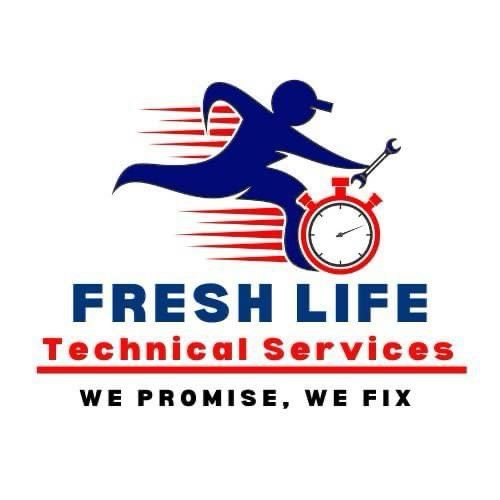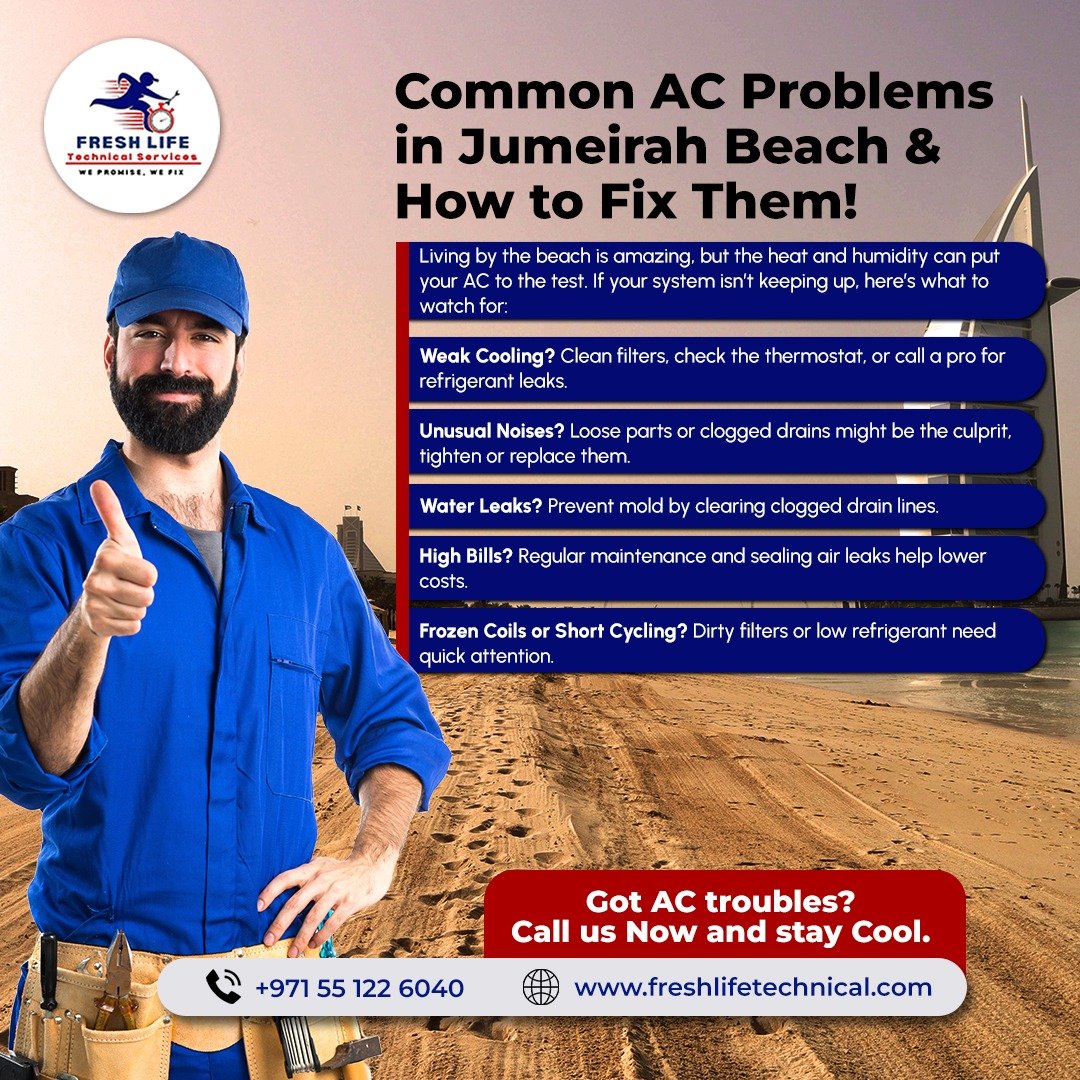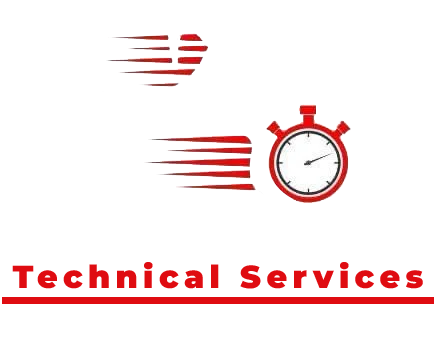Air conditioning essential for maintaining indoor comfort. However, frequent use can lead to various AC issues that impact efficiency, performance, and energy consumption. Understanding the common problems of your current job and its solutions can help you avoid costly repairs and provide a practical family environment.
Inefficient AC Cooling
If your air conditioner works and does not effectively include the space you want, there are several factors listed below.
- Dirty Air Filter: Dust and debris can block air flow, which minimizes cooling efficiency.
- Thermostat problem: A thermostat failure or an incorrectly installed thermostat can affect temperature control.
- Refrigerant leaks: Low refrigerant levels can compromise cooling performance.
Solutions:
The solution to this problem is to clean the filter or relace it within the timeframe of every 1-3 months. Make sure the thermostat is properly calibrated and adjusted in Cool mode. If the refrigerant level is low, contact a professional technician for inspection and repair. Regular maintenance of alternative currents can help prevent cooling issues before they become serious.
Unfamiliar Noises from the AC
If your AC unit is making rattling, buzzing, or hissing sounds, it could be due to a number of possible issues, including a clogged air filter, loose parts, debris buildup, a failing motor, low refrigerant levels, or a problem with the condensate drain, which can be explained as rattling, clunking, grinding, hissing, gurgling, or squealing sounds however if the noise is loud or unusual it is better to contact a professional HVAC technician to diagnose and fix the problem before further damage occurs.
Solutions:
Inspect and tighten loose components. Replace worn-out parts with professional assistance.
Seek expert repair for refrigerant leaks to avoid health hazards.
Water Leakage
Water leaks can cause Mold growth and structural damage. The condensation wires can get plugged as algae and mold grow inside the pipe and eventually clog it. This is why at least 1/3 cup of vinegar should be poured into the condensation line every three months. This keeps the free line of algae and allows for smooth movement. If the condensation line gets clogged, the air conditioner may be disconnected from the floating switch or you may notice water in the drain pan under the air processor.
Solutions:
Unclog the drain line using a wet-dry vacuum and replace a damaged drain pan to prevent further leakage.
Uneven Cooling in Your Home
Blocked ventilation holes are one of the major reasons of unequal cooling in the home. It is better to check for any trash, dust, or furniture that blocks these holes. If the ventilation holes are clean and unlocked, you can resolve uneven cooling and partially close certain ventilation holes on the ground floor to redirect air to other areas of your home.
Solutions:
Ensure vents are clear of obstructions. Seal any ductwork leaks to improve airflow and temperature consistency.
High Energy Bills
Air conditioners consume a significant amount of electricity, but reduced efficiency can lead to even higher energy accounts. Factors such as dirty filters, conduit leaks, components (engines, capacitors, etc.), low refrigerant levels, lack of maintenance, aging systems or inappropriate installations can contribute to an increase in power consumption for everyone. An unexpected increase in your electrical account can result.
Poor AC maintenance: Dust buildup and worn-out parts reduce efficiency.
Air leaks: Gaps around doors, windows, or ducts force your AC to work harder.
Outdated AC unit: Older systems consume more energy.
Solutions:
Schedule regular AC maintenance to enhance efficiency. Seal air leaks to prevent energy waste.
Upgrade to an energy-efficient AC model if your unit is old.
Refrigerant Leaks
Leakage of refrigerant in an air conditioner is a serious problem when coolant comes out of the system. This significantly reduces cooling properties and increases the explanation for energy and potential damage. It’s being ignored. Important signs include warm air, blowing through ventilation holes, ice build-up on evaporators, hissing near the device, and a prominent puddle. Low refrigerant levels can be the cause:
- Unstable AC cooling
- Hissing noises
- Ice buildup on evaporator coils
Solutions:
Contact a professional technician to fix refrigerant leaks safely.
AC Not Turning On
If the air conditioner doesn’t light, the most likely author has a defective thermostat parameter (check if the temperature is lower than the current room) electric power is problematic with the device itself Panel or problem. First of all, these basic elements should be checked before examining more complex issues, such as refrigerant leaks and defective components. If your air conditioner refuses to start, there are possible reasons for this:
- Tripped circuit breakers due to power surges.
- Malfunctioning thermostat preventing signal transmission.
Solutions:
Reset your circuit breaker. Check and replace a faulty thermostat.
Short Cycling (Frequent On & Off Cycles)
Short cycling” refers to an air conditioning unit frequently turning on and off in rapid succession, essentially not completing a full cooling cycle, which can be caused by various issues like dirty air filters, clogged condenser coils, low refrigerant levels, faulty electrical components, or a thermostat set too low, leading to the system overheating and shutting off prematurely. If your AC turns on and off too frequently, the problem may stem from:
- Incorrect AC size: An oversized AC cools too quickly, causing short cycles.
- Dirty filters: Clogged filters lead to overheating and shutdowns.
Solutions:
Ensure your AC unit is the right size for your space. Clean or replace air filters regularly.
Frozen Evaporator Coils
Ice buildup on the evaporator coils can be caused by:
- Restricted airflow due to dirty filters.
- Low refrigerant levels affect heat absorption.
Solutions:
Clean or replace air filters.
Check refrigerant levels with professional assistance.
Bad Smells Coming from AC
If your AC emits foul Odors, it could be due to:
- Mold and mildew growth from excess moisture.
- Dirty components accumulating dust and bacteria.
Solutions:
Clean your AC unit and replace filters.
Hire professionals for deep cleaning if the smell persists.


